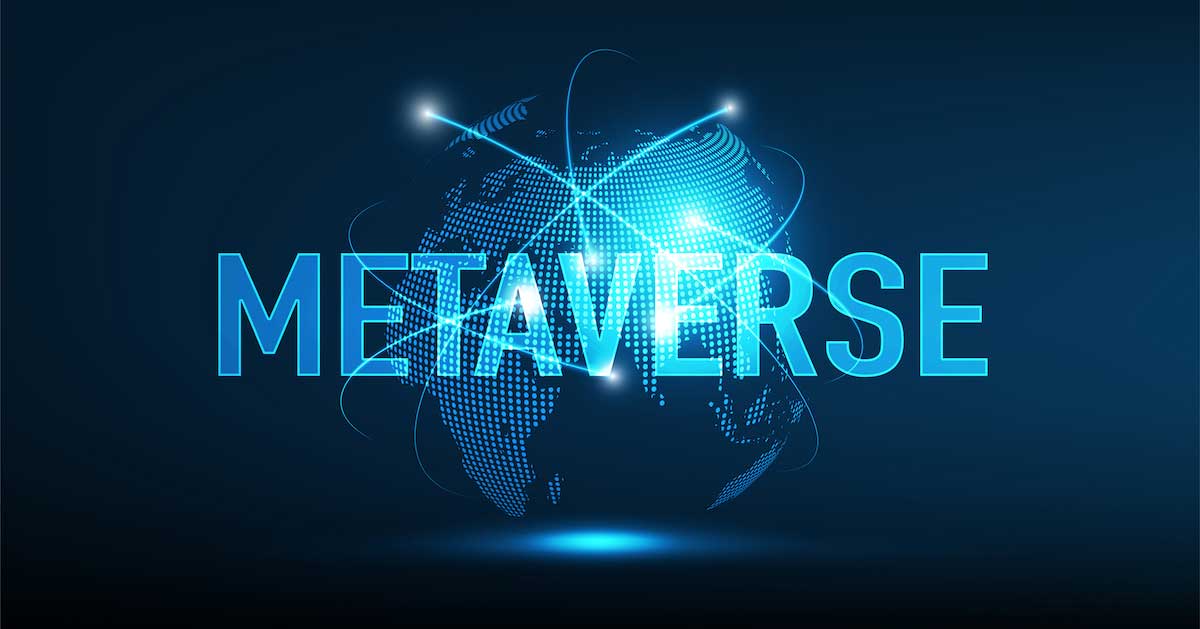Metaverse. The word itself makes me think of a blockbuster movie, produced by a huge network, anticipated by an even bigger audience that embraces the subject matter and engages younger generations in buying tickets, while the producers sit back enjoying the fruits of their labor. This is one way of thinking about it, and the crazy part is that in reality, the metaverse is going to have such a large impact on society that we have no idea what this really means for the future of the event and hospitality industry.
If the contemporary internet experience is two-dimensional—meaning you browse and scroll through it on a screen—the metaverse is 3D. You’ll be “walking” through it via connected headsets. Essentially, the metaverse is a virtual world with virtual assets such as land, buildings, offices, cars and cryptocurrency. It is an entire world where people can congregate, communicate, chat and share. Think of it in terms of you as a business owner, needing to buy a website—that’s considered an essential nowadays, and you call it your digital real estate. Owning digital assets in the metaverse is the next step into a 3D world, and that’s potentially the way of the future.
Owning digital assets in the metaverse is the next step into a 3D world, and that’s potentially the way of the future.
Meta is the new established brand name of Facebook, and because it involves Mark Zuckerberg, you can only assume that it will make him that much richer as he embarks on the future with a vision that wired futurists and techies have been studying for the last two decades.
“The world should fear the impact of the metaverse,” Facebook whistleblower Frances Haugen said. Why? Because everything about you will be an open book for others to feed on. Not that it is a surprise, but Facebook and transparency are locked in an ongoing battle on the security and wellbeing of people around the world. Facebook knows that by changing the conversation, Meta will force people to give up more information, while Zuckerberg monopolizes the online world.
Our safety as individuals is at high risk. To participate in the metaverse you will have to add sensors in your home and workplaces. However, you do not have the advantage of choosing if your employer decides to become a metaverse company. Your personal data is just as it says, “personal and private.”
When I thought about writing this article, I called upon my colleague Alan Smithson whose company MetaVRse has been in business for five years and who has been a leading force behind this new technology.
Brands will benefit from the metaverse the most as they produce interactive video and get circles of people conversing while meeting people in the virtual world, creating presence and comradery.
So, let’s ponder an idea. You create your own avatar much like an emoji and you enter what is naturally a gamer’s world, where everyone you work with has an avatar. You begin to have meetings as an avatar of yourself and soon your avatar emerges as a bigger player in a global world with virtual and live (hybrid) players online only.
Alan explained it to me this way: “The internet was designed to go on and off. Augmented reality allows you to walk into a 3D world that requires a VR headset. In virtual reality, you are blocked out from the real world. In augmented reality (AR), the digital world comes out into the real world.”
You’re likely scratching your head right now and asking yourself how does this impact me? As event professionals, you have to plan for all demographics, roadblocks, generational changes and virtual worlds that play with each other in a virtual sandbox, so to speak.
Brands will benefit from the metaverse the most as they produce interactive video and get circles of people conversing while meeting people in the virtual world, creating presence and comradery.
The metaverse is an immersive next-generation version of the internet, likely rendered by virtual or augmented reality technologies.
The creation of 3D worlds, avatars and 3D assets will be converted to 3D versions with super-high-resolution keynote events, with interactive Roblox-like worlds that have breakout sessions and plenary networking.
It is unclear whether there will be one metaverse or many different separate metaverses (or any metaverse at all, really), but this seems to be the one constant: The metaverse is an immersive next-generation version of the internet, likely rendered by virtual or augmented reality technologies.
Venture capitalist Matthew Ball, whose writing on the metaverse has influenced Zuckerberg, describes the metaverse as “a successor state to the mobile internet” and “a platform for human connection.”
But the metaverse will be for work, and you can expect lots of workplace applications, too.
“It’s not something that you do for fun yet,” said Stanford professor Jeremy Bailenson. “VR has always been about solving problems. You’re putting something on your head. You can’t see the real world. You can only do it for a certain amount of time because it is different perceptually than the real world.”
What you need to know now:
1. Microsoft wants to make the metaverse available on any device.
2. Snap AR-based connected lenses put Snapchat closer to the metaverse than many social media platforms.
3. Nike recently changed its trademark fillings because of the metaverse.
4. There are others who are making changes and you should keep your eyes and ears to the reality of the future.
Are you ready for the Metaverse?

